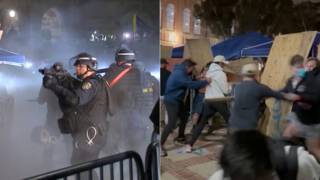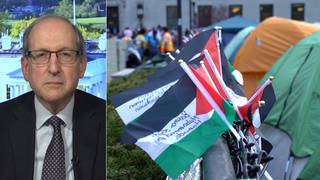
Related
This month a coalition of grassroots organizations in the city of Inglewood scored a historic victory against Wal-Mart, thwarting plans by the retail giant to build a giant “Supercenter” the size of seventeen football fields in the west of Los Angeles County. Construction of the Supercenter would have represented Wal-Mart’s first foray into the supermarket business in Los Angeles. [includes rush transcript]
But it was cut short when voters in Inglewood voted down a referendum that would have ceded control over sixty acres of barren land near the Hollywood Park Racetrack to Wal-Mart. Had the voters of Inglewood approved the referendum, they would have essentially granted Wal-Mart a retail village of sorts, exempt from the city’s zoning, environmental, and planning requirements. Sixty percent of Inglewood residents voted against the measure, despite a more than one million dollar public relations effort by Wal-Mart.
Although the company’s defeat at the ballot box represents a setback in its plans to expand into Southern California’s grocery industry, the corporation’s impact on supermarket workers is already being felt. Last fall, some 70,000 grocery clerks throughout Southern California walked out on strike against the Ralphs, Vons, Albertsons, and Pavilions grocery stores; after four months and 18 days spent on picket lines, those workers agreed to a new labor contract full of concessions, including steep cuts in wages and health care benefits for newly hired employees. Although the grocery chains collectively lost more than a billion dollars in revenue over the course of the strike, managers declared victory in the settlement, saying concessions from supermarket workers will allow them to compete with Wal-Mart’s push into the grocery industry.
- The Rev. Altagracia Perez, organizer with the Coalition for a Better Inglewood, one of the community groups that successfully mounted a campaign against a Wal-Mart Supercenter.
- Renuka Uthappa, a journalist with the Detroit-based publication, “Labor Notes.” In this month’s edition, she covers the defeat of grocery workers with the United Food and Commercial Workers union at the hands of southern California’s major grocery chains.
Transcript
AMY GOODMAN: Let’s begin with Reverend Perez. Talk about this struggle in Englewood. You went up against a million dollar pr campaign and funding referendum.
THE REV. ALTAGRACIA PEREZ: I think in part it had to do with the vision of the people that were in the community and understood the impact this would have on them, and I’m very proud of voters of Englewood. But I think also, you cannot beat hard work. People were working on this at least a year before this actually came to a vote. There was an understanding that Wal-Mart was going to come into the city. Even though the city had concerns about a super center and had tried to pass a zoning law that would limit the size of what could happen, and then rescinded it for fear of being sued by Wal-Mart. There was interest in the community, especially by the workers that live in Englewood, and you had — it would impact them, so they began to have meetings over a year ago with the workers in the community, and the workers — workers and residents of the community that they knew would have the impact, knew their contract was coming up for a vote, and understood what could happen if Wal-Mart were allowed to come in. And then slowly, joined by churches and local businesses, and politicians, to create this coalition of organizations and individuals that really wanted to say that this community should have a voice in the development and the growth of its city and that. Just because Wal-Mart has a lot of money does not mean it can come in and do whatever it wants.
AMY GOODMAN: 17 football fields. That’s the size of the super center?
THE REV. ALTAGRACIA PEREZ: It was going to be 17 football fields big. I think it was — it was insane the size without any kind of environmental impact report. What was scary in parts of the campaign is that a lot of people thought they were voting whether or not to bring Wal-Mart in. They assumed they would vote to bring Wal-Mart in and the city would negotiate how Wal-Mart comes in. They were actually voting on — that’s what it says on the petitions that people signed — but what they were actually voting on was the thing that’s 72 pages big, and it was where the trees go, what streets got closed off. Where traffic lights went. Anything that people wanted to change later had to be brought back to a vote again, and two-thirds of voters needed to pass any change after the simple majority voting and of this initiative — it was just insane. I mean it, was truly giving up all of their rights in order to be grateful that the giant mega store was going to come into their community.
AMY GOODMAN: Renuka Uthappa, can you put this struggle in a national context, this defeat of this Wal-Mart super center in Englewood, California.
RENUKA UTHAPPA: Well, it hopefully bodes well for that kind of defeat elsewhere when big Wal-Marts try to come in. I think specifically in the context of the grocery strike that just happened in Southern California, the specter of Wal-Mart was used as a threat. The union leaders were saying that — or the companies rather — were saying that we have to make these changes. We have to do these deep concessions. We have to get these from the union because Wal-Mart is coming in, and Wal-Mart is going to — we have to drop down. It’s a race to the bottom. They were actually arguing, we want to race down to the bottom with Wal-Mart.
AMY GOODMAN: Explain how it works. How Wal-Mart can offer low prices and wipe out grocery stores.
RENUKA UTHAPPA: They have a system by which they can get their goods from the — they can change where they get their goods and they have the different vendors. They can change those very fast and they pay their workers very, very, very little. And they don’t offer many benefits. They do say they offer health benefits, but about — I think about a third of their workers can actually afford them.
AMY GOODMAN: Can they also actually lose money on their grocery store part of the super center, and that way wipe out local competition, and make it back in other areas of the super center?
RENUKA UTHAPPA: That, I’m not sure of.
THE REV. ALTAGRACIA PEREZ: For sure. I mean, one of the things that they have is an incredible purchasing power, and they’re able to sell things at a rate that no one else can and do it at the same time. But it’s interesting in other cities after they do that and they wipe out the competition in the community, and they’re able to raise prices still remaining competitive, but raising them higher than what they were doing them initially, because now they have no one to compete with.
AMY GOODMAN: Right now when you look at the struggle of the grocery workers here. Can you talk about what it means, and the time they spent out and what they got in the end?
RENUKA UTHAPPA: The time they spent out was incredible, and I think in all, the activists, the community activists and everyone are very proud of what they did. They spent almost five months out. [music–please stand by]
RENUKA UTHAPPA: They did not win anything significantly better than anything offered by the companies.
AMY GOODMAN: Now, in the community, of Englewood, what is the feeling after the victory against Wal-Mart that — what happened to the grocery workers?
THE REV. ALTAGRACIA PEREZ: It was heartening for a lot of the grocery workers in Englewood that had been involved in the struggle from the beginning. I think they felt even though they lost in terms of what they could have gained in their contract, they won because in the end they showed their power together with the community power could defeat Wal-Mart. I think for the community itself I think it’s feeling strong. I think it feels like, well, if we can stop Wal-Mart, we could do anything. But there’s a lot to be said for the fact that when Wal-Mart was doing was so beyond anything reasonable, creating its own laws and kind of exempting itself from everything that Californians have fought for to protect community residents in the development process, that I think it’s just — it really was ridiculous. So even people that wanted Wal-Mart to come in to the city ended up not wanting to vote for the proposition. They wanted Wal-Mart, but they didn’t want it this way. I think the feeling is, now we can tackle these things because the coalition was broad and feels very good about the work it was able to achieve.
AMY GOODMAN: Renuka Uthappa, can you talk about how it was covered by the press? You’re a reporter with “Labor Notes.”
RENUKA UTHAPPA: In the mainstream stream press there was a lot of attention given to I think the company side of things in terms of saying that there’s — the company is simply asking for a few things here. And the union did not have a policy of having workers talk to the press to any significant extent. What the press was getting was the union’s PR on a particular struggle. In “Labor Notes” we tried to cover some of the other angles. We try to cover things from a rank and file perspective. The angles that were left covered, the union focused almost solely on the health care which is an extremely important component, but they didn’t focus as much on what workers are dealing with now, which is the two-tiered system that even has a — part of it where if you are — if you get a promotion now, if you are a veteran for — and had been there for a long time, if you get a promotion, you are automatically promoted into the second tier. So your wages are dropped. And — also now there’s a target on the backs of people who are long-time workers because it’s to the company’s advantage to fire them, and find some way to get rid of them, and then bring in the lower-tiered workers. That was not paid as much attention to in the media.
THE REV. ALTAGRACIA PEREZ: I think it was significant because I know the people in my own congregation, when it was only about the health care issue, they felt that’s a big crisis and they could understand the company’s position. But then when I would tell them about the two-tiered system, they would say, that’s horrible, you cannot let that happen. I think it was a miscalculation that more of all of the issues that they were dealing with did not go out.
AMY GOODMAN: I want to thank you both very much for being with us. Reverend Altagracia Perez, organizer with the Coalition for a Better Englewood, one of the community groups that successfully mounted a campaign against the Wal-Mart super center, and Renuka Uthappa, a journalist with the Detroit-based publication, “Labor Notes.” In this month’s decision, she deals with the grocery workers with the United Food and Commercial Workers at the hands of the Southern California major grocery chains. Can you tell us the website of Labor Notes.
RENUKA UTHAPPA: The website of Labor Notes is www.labornotes.org. If I could take one second to mention, if you are in Los Angeles, we’re having a forum today called Building Power: Next Steps for Grocery Workers and Allies.
AMY GOODMAN: I want to thank you for being with us. We wrap up a special thank you to the team making this bicoastal broadcast possible.











Media Options